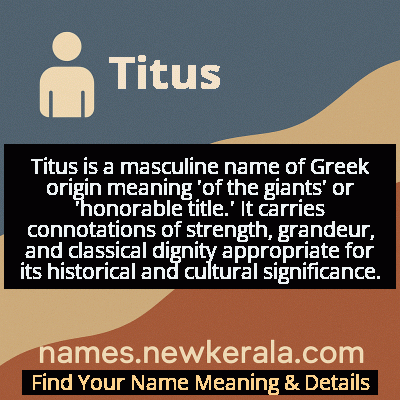Titus Name Meaning & Details
Origin, Popularity, Numerology Analysis & Name Meaning of Titus
Discover the origin, meaning, and cultural significance of the name TITUS. Delve into its historical roots and explore the lasting impact it has had on communities and traditions.
Name
Titus
Gender
Male
Origin
Greek
Lucky Number
8
Meaning of the Name - Titus
Titus is a masculine name of Greek origin meaning 'of the giants' or 'honorable title.' It carries connotations of strength, grandeur, and classical dignity appropriate for its historical and cultural significance.
Titus - Complete Numerology Analysis
Your Numerology Number
Based on Pythagorean Numerology System
Ruling Planet
Saturn
Positive Nature
Ambitious, efficient, realistic, and authoritative.
Negative Traits
Materialistic, stressed, confrontational, and can be overly ambitious.
Lucky Colours
Dark blue, black.
Lucky Days
Saturday.
Lucky Stones
Blue sapphire, amethyst.
Harmony Numbers
2, 4, 6.
Best Suited Professions
Business leaders, managers, financial services, law enforcement.
What People Like About You
Leadership, determination, organizational skills.
Famous People Named Titus
Titus Flavius Vespasianus
Roman Emperor
Completed the Colosseum and ruled during the eruption of Mount Vesuvius
Titus Livius
Roman Historian
Wrote 'Ab Urbe Condita,' a monumental history of Rome
Titus Bramble
Professional Footballer
Played for Premier League clubs including Newcastle United and Wigan Athletic
Titus Welliver
Actor
Known for roles in 'Bosch,' 'Lost,' and 'Deadwood'
Name Variations & International Equivalents
Click on blue names to explore their detailed meanings. Gray names with will be available soon.
Cultural & Historical Significance
Extended Personality Analysis
People named Titus are typically associated with strong, authoritative personalities marked by natural leadership abilities and unwavering determination. They often exhibit a commanding presence that inspires confidence in others, combined with practical intelligence and strategic thinking. Their decision-making tends to be decisive and grounded in principle rather than emotion, reflecting the name's Roman military origins. Despite their strength, Titus-named individuals usually balance their authority with a deep sense of responsibility and loyalty to those they lead or protect. They are often perceived as pillars of stability in their communities or workplaces, offering reliable guidance during challenging situations. Many develop a dry, sophisticated sense of humor that emerges in comfortable settings, revealing complexity beneath their typically serious exterior. Their combination of strength, honor, and practical wisdom makes them natural problem-solvers who approach life with both courage and thoughtful consideration.
Modern Usage & Popularity
In contemporary naming practices, Titus maintains a steady presence as a strong, classical choice that appeals to parents seeking names with historical weight and distinctive character. While never reaching the popularity peaks of more trendy names, it consistently ranks within the top 1000 names in English-speaking countries, demonstrating its enduring appeal. The name has seen particular resonance among families with interests in classical history, literature, or those seeking alternatives to more common biblical or saint names. Recent decades have shown increased usage as part of the broader revival of ancient Roman names, with Titus offering a particularly powerful and accessible option. Its modern usage spans diverse socioeconomic backgrounds, though it maintains special appeal among educated families who appreciate its rich historical associations and strong phonetic qualities. The name's stability in popularity charts suggests it has transitioned from a purely classical reference to a established modern choice with timeless qualities.
Symbolic & Spiritual Meanings
Symbolically, Titus represents the embodiment of classical virtue and enduring strength. The name evokes images of Roman architectural marvels—pillars, arches, and amphitheaters—symbolizing stability, grandeur, and the lasting impact of principled leadership. Metaphorically, it suggests a bridge between ancient wisdom and contemporary application, representing the translation of timeless values into modern contexts. Titus symbolizes the balance between power and responsibility, reflecting the Roman ideal of civic duty paired with personal authority. The name also carries connotations of historical continuity, serving as a living connection to cultural traditions that have shaped Western civilization. In psychological terms, Titus represents the archetype of the honorable leader—someone who wields influence with integrity and whose actions are guided by both strength and moral principle. This rich symbolic tapestry makes the name particularly meaningful for those who value historical consciousness and the enduring relevance of classical virtues.

